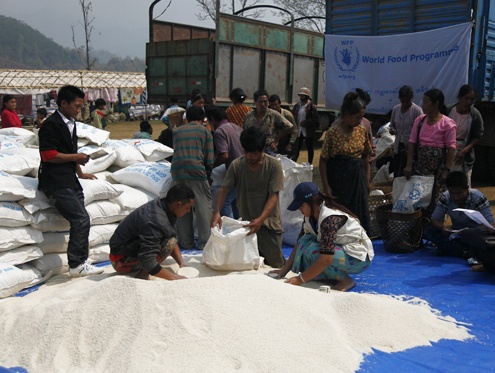The United Nations humanitarian relief programme geared towards assisting those displaced by the Kachin conflict has so far raised only US$14.6 million of the US$50.9 million UN officials estimate is needed.
“In view of the serious funding shortfall, the Emergency Relief Coordinator earlier this week allocated US$3 million from the Central Emergency Response Fund (CERF) under the under-funded window,” said UN General Secretary Ban Ki Moon’s spokesperson Eri Kaneko in an exchange with DVB last week.
According to Ban’s spokesperson, the CERF funding “is intended to fill critical gaps in humanitarian programme to sustain operations, including needs associated with the current rainy season, while other funding sources continue to be identified”.
Officials with the UN’s Office for the Coordination of Humanitarian Affairs (OCHA) estimate that there are 85,600 internally displaced people (IDP) in Kachin state with 35,000 sheltering in government-controlled camps and an additional 50,600 living in camps located in the Kachin Independence Organisation (KIO)’s territory.
The UN says that as of the end of June there were also an additional 4,400 displaced people living in government-controlled camps located along a stretch of Kachin-inhabited parts of northern Shan state mainly Namkham, Namtu, Manton, Muse and Kutkai.
Aid workers report that the actual number of IDPs in government-controlled areas may be significantly higher than the UN estimates because large numbers of Kachin are reluctant to register with camp authorities out of fear that the government would punish them.
Many appear afraid of ending up like Brang Shawng, a displaced Kachin farmer who was living with his family in a camp near Myitkyina until last year when he was arrested last for his alleged connection to a KIO plot – a charge his family strongly denies.
Apart from having difficulty raising funds for Kachin humanitarian relief, the UN and its agencies have struggled to gain access to those IDPs living in camps located in areas controlled by the KIO.
Last month, when a UN aid convoy reached the KIO’s second largest town of Mai Ja Yang, it was the first time that the international body had been given permission to travel to KIO territory by the Burmese government in nearly a year. It remains unclear when further aid convoys will be allowed to travel behind rebel lines.
Figures provided by the UN show that from December 2011 to June 2013, UN teams made a total of 11 cross-line aid missions to KIO territory. The aid that the UN delivered reached about 20 percent (approximately 10,000 people) of the total number of IPDs living in non-government controlled territory.
Because of the serious restrictions preventing aid reaching IDPs in KIO territory, the situation in these camps remains very serious. According to a report released in May by the US aid group Refugees International (RI), the IDPs camps in KIO areas were described as “a crisis in waiting”.
The Washington-based group recommends that the UN and international NGO’s do more to support the Kachin civil society organisations already operating on the ground in KIO territory.
Yet this has largely not happened since their report was published. Instead a serious lack of food and opportunities to earn an income has driven many displaced Kachin to venture into China in search of paid work. This has in turn led to conditions where many Kachin women refugees have been tricked into forced marriages with Chinese men or other forms of human trafficking after crossing into China.
It remains to be seen what the UN will do about the increasingly dire conditions in the Kachin IDP camps. The RI report criticised the global body for failing to hold the government to account for its “broken promises of humanitarian access to parts of Kachin State held by the Kachin Independence Organization (KIO)”.
While the RI report also urged the UN’s Burma policy team to “change its current, overly cautious approach to its advocacy with the government”, aid workers say it remains very unlikely the UN will do so out of fear that their agencies will have their already limited access in Kachin and Arakan states further restricted.



